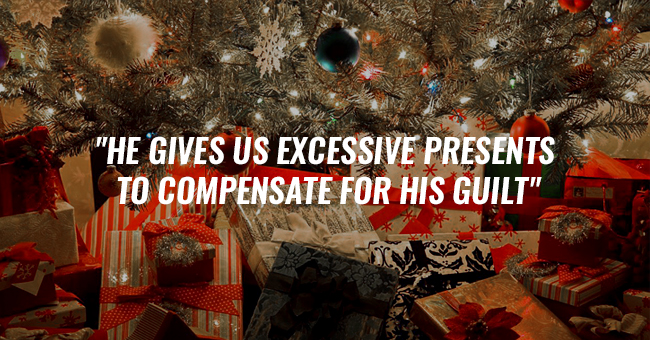Buying Christmas Presents
It’s Christmas morning. I’ve just woken up to the smell of crispy bacon and the blasting tune of Mariah Carey’s ‘All I Want For Christmas Is You’.
I look to the side of my bed, and there sits a pillowcase full of wrapped presents. My 6-year-old sister barges into my room, lugging a similar bag of her own. “OMG. Santa came last night! Look at all the things he gave me.”
She empties her pillowcase, and the presents spill out like gold coins out of a pot. I see her tiny body engulfed by gifts and I wonder how she’ll react when she learns the truth—Santa Claus isn’t real, and the presents we get every year are a reminder of the estranged relationship I have with my Dad.
Using presents to nullify his guilt
Every year, my three siblings and I receive around forty presents each. The gifts range from a pair of socks to a ping-pong table.
My frugal Chinese mother thinks the gift-giving tradition is unnecessary, and every year she would discourage my Dad from buying us presents. “One or two is enough,” she’d nag.
“But it’s Christmas. It’s tradition,” he’d argue.
As a child, I had no complaints when ‘tradition’ meant buying the entire aisle of ‘Toys R Us’. I even believed every other kid was getting a DSLR like I was.
However, as I grew older, I learned how privileged and abnormal our Christmas celebrations were.
I realised my father was giving us excessive presents to compensate for his guilt for not spending time with us.
Having an absent father
The man was hardly a big part of my growing up.
He’d travel for months at a time, missing more birthdays and graduations than I can count. There were even several Christmases where he had to leave dinner halfway for work.
To make up for his being away, he would give us drum sets, scuba diving gear, golf, and baseball equipment. Everything you could possibly think of, I’ve probably owned at some point.
“What’s the point of buying all this crap when we never use them?” my mother would nag as the presents piled up in our basement.
“Because it’s Christmas,” was always his answer.
Maybe why he clung on so fiercely to this belief, was because the growing pile of junk was the only physical proof of him being a good father.
What being a good father means
Still, I understand his absence isn’t his fault.
I know he took on his well-paying, stressful job to provide us with a comfortable life. Yet, I resent how he doesn’t try to establish a father-daughter relationship.
When we have family time, he’s always glued to his laptop. He prefers to eat alone, instead of having dinner together. Every attempt to speak to him gets brushed off with a brusque “I have no time”.
To him, being a good father is providing a roof over his children’s heads, feeding and clothing them.
But being a good parent is more than just providing materially for your child. It’s also about nurturing and building a relationship with them.
What’s the point of giving them so many presents if you don’t know who they are?
Building A Relationship With My Father
My Dad isn’t a bad person, but I’m disappointed he isn’t a good father.
I want to blame him for all the times he wasn’t there, and I want to get angry at him when he buys me a third Fitbit because he forgot he’d already gotten me two.
But I can’t because every time I do, I feel like an ungrateful daughter. I know I’m lucky to want for nothing, and how I sound like a spoilt, unappreciative brat when I complain about how much stuff I have.
This Christmas I don’t want a jukebox, or another Fitbit, or a 4-person kayak. Just this once, I’d like a conversation with my Dad.
Cover image: Source







